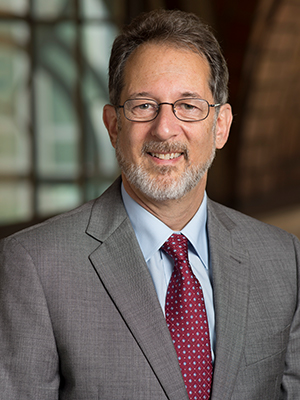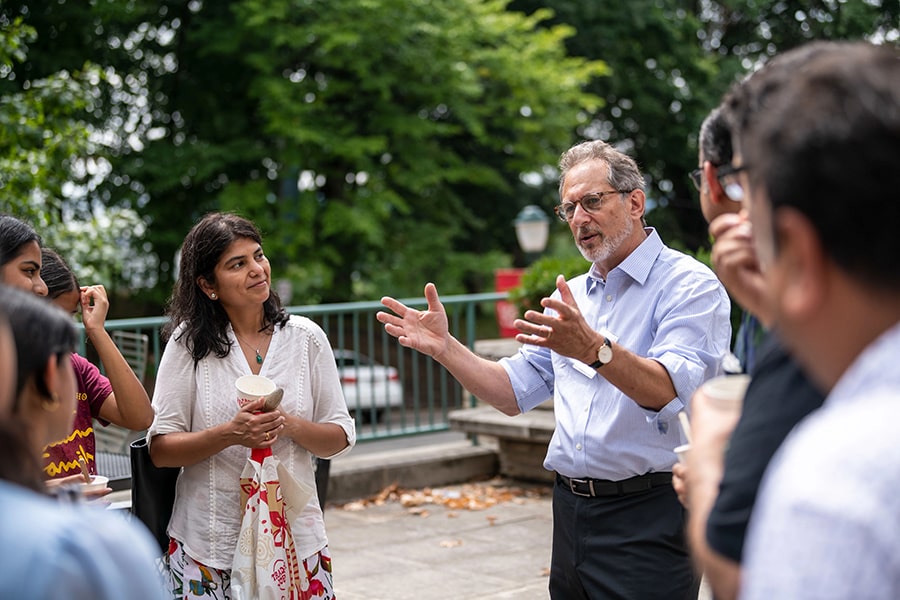Message from the Dean
 Welcome to the Dietrich College of Humanities and Social Sciences. At Carnegie Mellon, Dietrich is the home for research and education centered on humanity. From how the brain gives rise to the mind, to how humans actually make decisions, to how they should make decisions, to how a collection of individual agents can form a society, to how societies have evolved over time from small tribes to great nations, to how languages and cultures vary and how they shape the human experience, to the amazing edifices of literature and science produced by these cultures, our college is the home to some of the most exciting interdisciplinary research and teaching in the world.
Welcome to the Dietrich College of Humanities and Social Sciences. At Carnegie Mellon, Dietrich is the home for research and education centered on humanity. From how the brain gives rise to the mind, to how humans actually make decisions, to how they should make decisions, to how a collection of individual agents can form a society, to how societies have evolved over time from small tribes to great nations, to how languages and cultures vary and how they shape the human experience, to the amazing edifices of literature and science produced by these cultures, our college is the home to some of the most exciting interdisciplinary research and teaching in the world.
Our faculty do foundational and deep disciplinary research, collaborate across many disciplines, take on problems that are important to the world today, and share a passion for innovation in both research and teaching. Our students are trained in a wide array of disciplinary approaches, and they become involved in research early and often. They emerge from their experience at Carnegie Mellon able to communicate, think, learn, and understand the world in ways that will serve them for the rest of their life. Upon finishing their baccalaureate degree, they are among the most sought after liberal arts graduates in the world.
I invite you to browse our website - to explore our departments, interdisciplinary research centers, undergraduate programs and graduate programs. I invite you to read news stories about our faculty and students. They are relentlessly spectacular.
Richard Scheines
Bess Family Dean, Dietrich College of Humanities and Social Sciences
Professor of Philosophy
About the Bess Family Dean: Richard Scheines
 With his experience in interdisciplinary research and education — the heart of a liberal arts education, Richard Scheines is leading Carnegie Mellon University's Dietrich College of Humanities and Social Sciences as it continues to use research and education to solve problems and impact society.
With his experience in interdisciplinary research and education — the heart of a liberal arts education, Richard Scheines is leading Carnegie Mellon University's Dietrich College of Humanities and Social Sciences as it continues to use research and education to solve problems and impact society.
Scheines, professor of philosophy, built his career on crossing academic disciplines and brings that approach to the Office of the Dean.
“The reason you go into academics is that you're curious, and you like the stimulation and the activity of working with ideas," Scheines said. “At the dean's level, I hope to find opportunities to seed projects that involve faculty from humanities and social sciences as well as other parts of the university.”
Before becoming dean of the Dietrich College in July 2014, Scheines served as head of the Department of Philosophy since 2005. In that role, he led the department to distinction with a focus on research that directly connects to a wide array of other fields, including computer science, math, statistics, brain science, medical ethics and psychology. Under his leadership, the department more than tripled its external research funding, strengthened its global reputation and attracted and retained the highest quality faculty and students.
He also was instrumental in working to establish a new Center for Formal Epistemology, which collaborates with similar centers at Stanford University and in Europe and Japan. Additionally, he is credited with helping to create the Patrick Suppes Chair — now held by Wilfried Sieg — developing a new interdisciplinary major in linguistics, and working with the Department of History to upgrade the ethics, history and public policy major.
Scheines joined the CMU faculty in 1990 and has additional appointments in the Machine Learning Department and Human-Computer Interaction Institute (HCII). His research focuses on causal discovery, the philosophy of social science, and educational technology and online courses. With CMU's Peter Spirtes and Clark Glymour, Scheines pioneered the development of the modern theory of statistical causal models, which have been successfully applied in fields from genetics to climate modeling, brain imaging to social psychology and educational research to economics. Their project, TETRAD, received a 2020 Super Artificial Intelligence Leader (SAIL) award at the World Artificial Intelligence Conference held in Shanghai. He led the design of the undergraduate major in human-computer interaction, and, with the late Steven Klepper, he redesigned a core methods course in social and decision sciences that received honorable mention in the American Statistical Association's Causality in Statistics Education Awards.
In technology-enhanced learning, Scheines directed the creation of two online courses and published the first empirical study to show that appropriately applying interactive, web-based instruction can lead to improved learning outcomes in college courses. He also has played a major role in the development of the university's new Simon Initiative, which aims to accelerate the use of learning science and technology to improve student learning, and to harness and leverage CMU's decades of learning data and research to improve educational outcomes for students everywhere.
Scheines has served on three committees for the National Academies of Science, all of which have completed their work and published books describing their findings: "Improving the Presumptive Disability Decision-Making Process For Veterans," "Food Marketing to Children and Youth: Threat or Opportunity" and "Review of EPA's Integrated Risk Information System (IRIS) Process."
"I can't imagine a more intellectually exciting place to work than Carnegie Mellon," Scheines said. "I've benefitted enormously from the value put on interdisciplinary work and from the astonishing variety of expertise available within a 5-7 minute walk from my office. I will do everything I can to create an environment that is exciting and enjoyable for all of our faculty and students.”